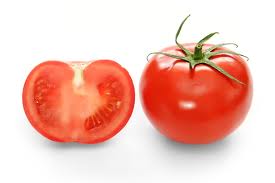 Tomatoes, native to the New World, are perhaps the most popular item found in home gardens. While often thought of as a vegetable, the tomato is actually a fruit. With thousands of varieties available, from the very large to the very small, you are sure to never completely explore the full diversity of this wonderful fruit. As a warm weather fruit, you can find locally grown tomatoes during the summer months, while greenhouse varieties are sure to be found in any supermarket even during the dead of winter.
Tomatoes, native to the New World, are perhaps the most popular item found in home gardens. While often thought of as a vegetable, the tomato is actually a fruit. With thousands of varieties available, from the very large to the very small, you are sure to never completely explore the full diversity of this wonderful fruit. As a warm weather fruit, you can find locally grown tomatoes during the summer months, while greenhouse varieties are sure to be found in any supermarket even during the dead of winter.
When growing tomatoes, it is important to remember the two main types of this fruit; determinate and indeterminate. Determinate tomatoes form a flower cluster at the terminal end of the plant, forcing the plant to stop growing in height. An indeterminate plant is one which does not stop growing naturally in height. While older varieties are of the indeterminate type, most modern breeds are determinate in nature.
Key Nutrients
Tomatoes are packed with vitamin C, potassium, fiber and vitamin A in the form of health promoting beta-carotene, which the body converts to vitamin A.
Health Benefits
Tomatoes are also a source of lycopene, which is the subject of current promising research on the role of plant chemicals that promote health. Research suggests that lycopene may play a role in the fight against cancer, especially prostate cancer. Like beta-carotene, lycopene is a carotenoid, responsible for the bright red color of the tomato, watermelon, and grapefruit. Although lycopene is available in all ripe tomatoes, a greater supply is more useful to the body in cooked tomatoes.
Vitamin A – Vitamin A, when converted into retinaldehyde, is a vital compound for healthy eyes. Furthermore, vitamin A is believed to fight against cataracts, macular degeneration and glaucoma. Vitamin A strengthens the membranes of the human body such as mucous membranes, respiratory, urinary and intestinal tracts. It is also essential for the lymphocytes, or white blood cells, that fight infection once in the body.
Vitamin C – Regular consumption of foods rich in vitamin C helps the body develop resistance against infections and scavenges harmful, pro-inflammatory free radicals. Vitamin C also helps to prevent respiratory problems such as asthma and lung cancer. Vitamin C has been shown to lower blood pressure, and therefore lessen the probability of hypertension.
Potassium – Potassium is an essential mineral which aids in fluid regulation, protein synthesis and cardiovascular health. High levels of potassium are associated with reduced risk for stroke, improved blood pressure control as well as bone health.
Season
Tomatoes are available during the summer months as well as the fall. Due to their popularity and ease of growth in greenhouses, you can find tomatoes year round in supermarkets.
Nutrition Information
Per 1 cup (180 grams):
Calories (cKal): 32
Protein (grams): 1.58
Total Fat (grams): .36
Carbohydrates (grams): 7
Fiber (grams): 2.2
Buying and Storing
When buying tomatoes, make sure they are free of blemishes, holes and mold. Tomatoes are best stored on a countertop, and can last up to one week when stored this way.
Best Way to Add to Diet
There are thousands of ways to enjoy a tomato. First, try slicing a tomato and serving with a small amount of cheese, olive oil and basil. Tomatoes make a great roasted addition to any dinner by simply cooking in an oven for around one hour. Tomatoes can be chopped and added to a soup, stew or made in to a tomato sauce. Surely, you will never run out of ideas when it comes to cooking tomatoes.
Tomato Recipe

 Not Sure What Healthy Foods To Eat?
Not Sure What Healthy Foods To Eat? This week we take a look at one of my favorite healthy foods...the mighty Avocado.
This week we take a look at one of my favorite healthy foods...the mighty Avocado.
No comments yet.